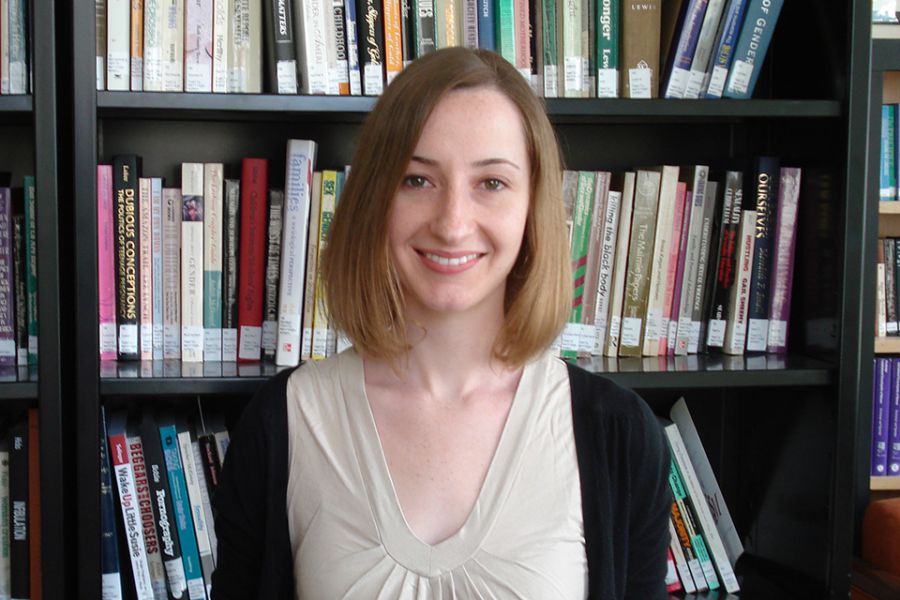Forty years ago, when a military dictatorship took power in Argentina and began “disappearing” political dissidents, the mothers of the missing didn’t use guns or bombs to fight back. They used photos.
Those photos were proof their loved ones existed, that their disappearance left a hole in someone’s life. They became an icon of the Madres de la Plaza de Mayo resistance movement that began in the late 1970s.
They also sparked something in Meghan Bosko, M.A. ’13, a lifelong painter with a passion for exploring how visuals shape culture and identity. Bosko’s thesis on how performance and photos were used in response to Argentina’s “Dirty War” recently won Illinois State’s prestigious James L. Fisher Outstanding Thesis Award.
“It’s just heart-wrenching,” she said. “The bravery these women showed in the face of such extreme violence and oppression—it tugs at the heartstrings. It’s something we can all relate to in a certain sense, but also not at all.”
Bosko left in early May for Argentina, where she plans to further explore how artists and filmmakers responded to dictatorships that were all too common in Latin America in the 1970s. Bosko’s award-winning, 124-page thesis is only a jumping off point, and one that she wouldn’t have discovered without Illinois State’s visual culture and women’s and gender studies programs.
The Pennsylvania native majored in painting as an undergraduate student, but it was a yearlong trip to Thailand teaching English that opened her eyes to the world of visual culture. She marveled at how revered the Thai king had become with help from visual cues; portraits of the monarch hang in virtually all homes there.
“It’s this ritual that takes over so much of their identity and daily life,” Bosko said.
She chose Illinois State’s visual culture program for her master’s. The small program gave Bosko lots of access to faculty, while also immersing her in interdisciplinary culture by requiring her to take non-art classes.
One of them was a feminist ethics course offered by the women’s and gender studies program and taught by Alison Bailey, the program’s director. A book reading about maternal politics introduced Bosko to Argentina’s female resistance movement—the women left behind by those who were “disappeared.”
That reading would form the basis for Bosko’s thesis, which Bailey says it “the most ambitious and original thesis I have read or directed during my 20 years at Illinois State.”
“Meghan’s project is brave, passionate, and extremely smart,” Bailey said. “Her manuscript has all the makings of a very successful book project.”
Bosko’s thesis is titled The ‘Re-Visioning’ of Argentina’s Disappeared: Strategies of Representation and Resistance. It focuses on three different groups: the Madres de la Plaza de Mayo; a separate group of women whose pregnant daughters were abducted and who are on a quest to locate their disappeared grandchildren; and a newer group comprised of the children of the disappeared, who use public-shaming events and radio broadcasts to demand justice.
Bosko is now headed to Argentina—her first trip to the South American country.
“I finally get to sit down and have some face-to-face interactions with people, and get a firsthand feel for what the climate is like there, as opposed to dealing with other peoples’ translations of it,” she said.
Bosko’s research and writing are “driven by a passionate attachment to her subject matter,” said Elisabeth Friedman, an art history professor and graduate coordinator of Illinois State’s visual culture program.
“Meghan is an enthusiastic and engaged student who brings an exceptional level of sophistication to her research and writing,” Friedman said. “It’s been a pleasure to work with her, and I’ve learned a lot from her.”
Bosko finished her master’s degree in May 2013 and plans to pursue her Ph.D.
“Hopefully, this trip to Argentina will take me in directions that I haven’t quite imagined,” she said.
Ryan Denham can be reached at rmdenha@IllinoisState.edu.


